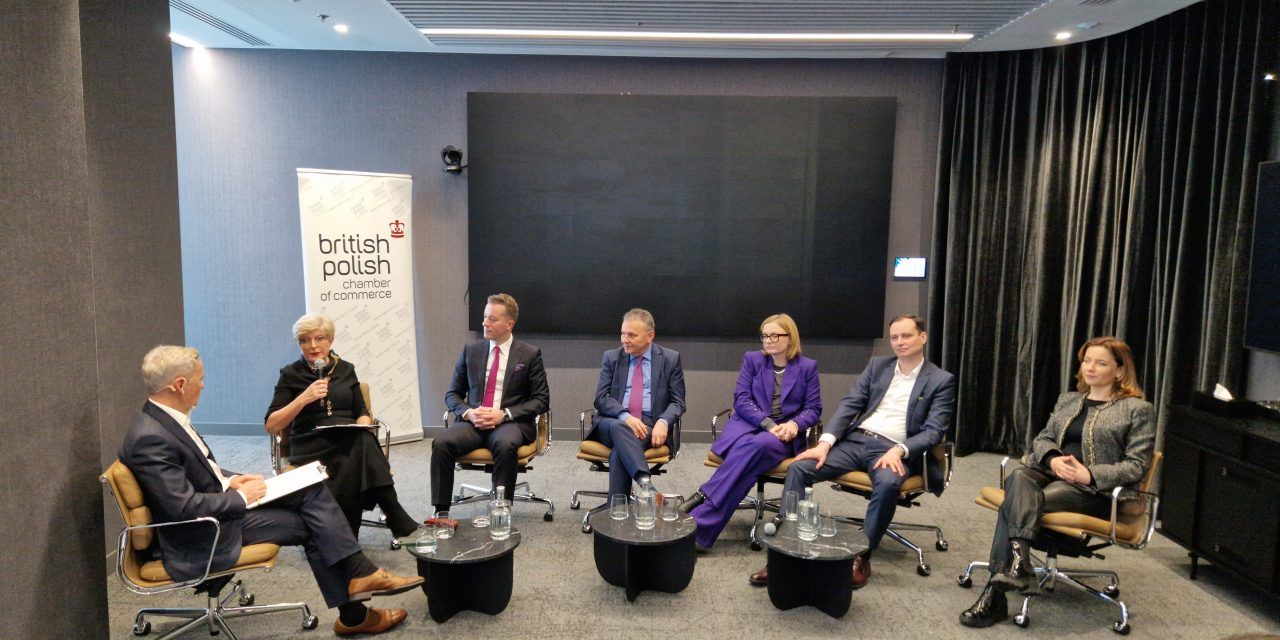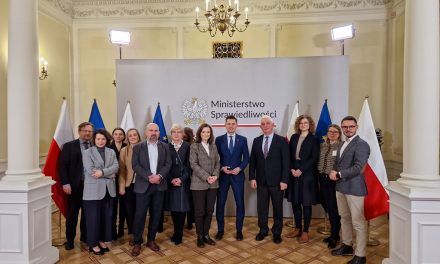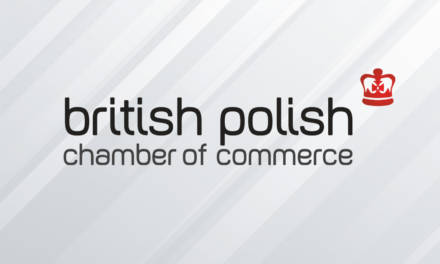It’s a long-standing BPCC tradition to start the year with a breakfast for business leaders to discuss prospects for the year ahead for business in Poland. This year’s expert panel took place live at CMS Poland’s Warsaw office in Varso tower on 11 January – a foggy day when viewed from the 42nd floor of the EU’s highest skyscraper.
After an introduction and welcome by Paweł Siwecki, the BPCC’s CEO, Prof Witold Orłowski, chief economic advisor, PwC Polska, set the scene at the macro level. Adam Uszpolewicz, former Aviva Poland CEO and BPCC board advisor, moderated the panel discussion with Agnieszka Gajewska, global government and public-services leader and CEE board member, PwC; Elżbieta Pełka, CEO Pełka & Partners, CEO of the Polish National Sales Awards and BPCC board member; Andrzej Pośniak, managing partner, CMS Poland; Joanna Romańczuk, managing director, TMF, and Michał Ślawski, CFO, Castorama Poland.
Prof Orłowski set out Poland’s macroeconomic landscape in 2024. “The prospects for the Polish and global economies are as clear as the view from the windows now; we are living in historic times – the world is changing, and it is not a safe place today.” He commented on the reaction of financial markets to the horrors we read about in Gaza “Would oil surge to $120 a barrel? No – it’s down to $77. We may hope situation will stabilise, with no further dramatic shifts. The world is on brink of recession; Germany as already there, the mood is dramatic, the UK, not much better, and the US headed that way. In Poland, however, the mood has changed. In the short term, I feel much more secure about developments in Poland over the next year. We have emerged from a period of stagnation with very low investment – now consumption will increase; there will be new money investment from government. We’ve got a problem with exports because our industry is so closely linked to the German economy. When will Germany start growing again? It’s in recession – but will this become stagnation? Growing domestic demand in Poland will result in growth, but with a deterioration of current account deficit. But it’s small enough not to cause any danger. Poland’s growth will be fuelled by domestic demand. To what extent will government be able to improve investment sentiment? Poland has the lowest investment-to-GDP in its history. This was the biggest failure of the outgoing government. International firms have been investing, but Polish firms have slowed right down. Who doesn’t invest will be losing competitiveness. Smart investment is needed. Poland’s labour problems are caused by its demographics, resulting in zero unemployment. Yet this can be solved easily by increasing productivity in the services sector; and that requires investment. Inflationary pressures are building up in service sector – there’s double-digit growth of wages with stagnating productivity,” said Prof Orłowski
Turning to inflation, he said that inflation, currently 6.1%, is artificially lowered by energy price subsidies and a VAT reduction, could be back to 7% to 8% later in the year – and that’s if there’s no new oil-price shock. “Inflation could be a problem for a couple of years; that 7% to 8% is enough to cause firms to have to adjust to it. I’m not talking about a Turkey-style inflation; the zloty is artificially strong right now, it will start losing value at some moment. Poland this year will see a continuous fight between the government, the president and the opposition. Without the freedom to pass laws, this year will be difficult,” said Prof Orłowski.
Asked about GDP growth, Prof. Orłowski said it would be between 2%-3%, stagnant in the first quarter, then accelerating. He assessed that EU money will boost growth, but will also accelerate inflation. However, the 2%-3% that can be considered as the new normal for Poland needs to be compared to 0.8% in EU. Unemployment is not a problem, the current account deficit will be between 2%-3%, and Poland’s public debt is low enough for us not to be too worried about any kind of crisis; although deficit will increase over the next two-three years, Poland’s ratings will not suffer.
Adam Uspolewicz asked Andrzej Pośniak about the changes that are needed in Poland’s legislative environment, after eight years in which the business community was treated badly, with legislation being made without proper consultation, lots of surprises, and the voice of small business completely ignored – what should change?
Mr Pośniak offered the analogy of a boxing match with no referee. When the fight starts, one boxer starts punching below the belt. The other boxer can abide by the rules and lose – or else to also start punching under the belt. He said that it’s not so much about what should change, but how should that change be brought about? “We have to strengthen state institutions. We need accountable, critical boards, tribunals, police; the proper functioning of the state. The state must be strong, prudent, honest, reliable, transparent and stable. Government should listen to the BPCC, to business, to society. As for taxation, Mr Pośniak said that high taxes in themselves are not bad. “A high tax rate where the money goes to the state and is spent wisely is better than a low tax rate where the money doesn’t go back into the state. Government must be credible; there must be a dialogue; it also needs to be fast, reliable, accountable – and predictable,” he said.
Mr Uszpolewicz commented that the growth that Prof Orłowski talked about was predicated on the flow of EU funds. He asked Agnieszka Gajewska whether Poland has a chance of getting €60 billion EU Recovery and Resilience Facility (RRF – or KPO in Polish) funds and utilising it by mid-2026. Ms Gajewska said that she believes it will be coming; together with €76 billion of structural funds, this is a significant cash injection in a short time. “KPO can bring 0.5% to 1% of growth,” she said. The milestones set in Polish KPO need to be addressed; though co-habitation with the President means that passing new laws might be challenging and the government will need to look for alternative solutions to address Commission’s concerns. “Will we get all of it? €60 billion in tranches? Will it make us more competitive and innovative?” she asked. One of the biggest beneficiaries will be state railway infrastructure operator PKP PLK and the state energy companies. On the other hand, she said Romania will be putting 43% of its funds into innovation. Time is not on Poland’s side. “We were meant to get the first tranche of money in October 2021, so we’re two and half years behind. To spend the money in time, we might need to change our plans; central government needs to reach out to local authorities, have a proper discussion with the private sector to become more efficient and more innovative, and determine what kind of investments are needed to increase their investment appetite and help leverage private sector investments.
Mr Uszpolewicz asked Michał Ślawski about the preparedness of Polish CFOs for major new legislative changes in ESG reporting and e-invoicing in the middle of this year, and about the state of Polish consumers – will they start spending again after two quarters of contracting retail sales? Mr Ślawski said that these are challenging conditions for retailers with disposable incomes shrinking years on year and pressure on household budgets having a negative impact on retail sales. Although we dropped in 2023, with the decline in the economy driven by poor consumption, I am moderately optimistic that we are seeing the first signs of recovery on market; the reduction of interest rates had a positive effect on consumer sentiment. Wages are rising, but this puts pressure on our cost side. We think that with inflation going down, consumer spending rising in 2024, and a more positive atmosphere, customer confidence, this year will be much better than 2023, but it will be a transition year from one that put our business model under pressure, to growth from 2025 on. In the home improvement sector, more mortgages are being granted, there are more house-build starts. As for CFOs – we should have all embraced KSeF (e-invoicing) already, it’s been postponed a few times, so there was time to ensure that processes and systems are adjusted to be compliant. Preparation is most important – change management, impact assessment, investment in IT, engaging experts; then good execution, project management, internal processes, continuous improvement, and finally control over all this. All this needs to be done with focus on careful preparation, said Mr Ślawski.
Joanna Romańczuk was asked by Mr Uszpolewicz how TMF, a business with 120 offices in 80 countries, sees Poland performing when it comes to attracting investment from areas such as professional services, accountancy and HR? “Is Poland still an attractive place to invest?” he asked. Ms Romańczuk said that the labour market was critical. “We are seeing a young generation that wants to work differently, remotely, with hybrid and home-office work; this has advantages and disadvantages,” she said. “The new generation wants to change the world in two years – they are super disloyal. A newcomer to a market offering a 30% premium causes pressure on existing employer. With fewer and fewer people entering the labour market, what can we do to work with these people? Efficiency and productivity is key, with a focus on value-added activities. This requires strategy. Young ones don’t want straightforward career. And yet employers often neglect those in their 50s and 60s – we need to create opportunities for those with a willingness in work. Poland remains attractive; more and more Asian money is coming to Poland. Wage arbitrage – Poland is pretty resilient despite eight years of trauma, the administrative burden and complexity of doing business, having to report in different ways, no government gateway portal – but despite all that, investment is still high,” said Ms Romańczuk.
Mr Uszpolewicz asked Ela Pełka about prospects for working with the new government, and how the BPCC should be engaging with it, and engaging with other chambers and NGOs. Ms Pełka said that despite the experience of the past eight years where some of the mechanism, transparency and credibility of the government had been broken, the BPCC has been in Poland since 1992, and patterns of cooperation have developed. “The new government is open to discussions. Our meetings with representatives held in the run up to the October elections were crucial in establishing dialogue and bridges; of the six deputies we met with, three have gone on to be ministers, one a deputy minister and one deputy speaker. Parliamentary committees are more open; the BPCC public affairs group gives a huge possibility of sharing best-practice, presenting evidence-based policy, and properly assessed impact on businesses. We can’t change everything overnight, what we present has to be realistic, not creating too many demands. Parliamentary committees may be flooded with requests right now, and many contradictory policy suggestions. The priority for the new government right now is restoring the rule of law and reversing the state capture,” she said.
“The BPCC’s membership represents around 25% of all foreign direct investment into Poland. Yet if we work together with other chambers and present to government a united approach, we can be even more successful in shaping a business environment that attracts more investment. Influencing policy outcomes is more likely when business groups can clearly demonstrate the public interest behind proposed measures. Evidence and data are also of key importance.
“Cooperation with the British Embassy is extremely important. The BPCC is looking after members’ businesses and can make a difference,” said Ms Pełka.
























